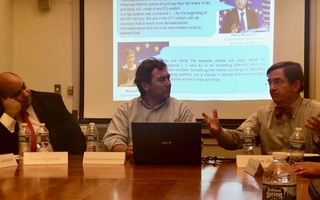{shortcode-08067a8aa7274b539e86319cec048fa89bcccfb4}Since Donald Trump’s victory in the 2016 presidential election, Harvard affiliates have voiced concerns about his stances on a number of issues, including immigration, federal research funding, and climate change.
But some alumni and tax experts say that Trump’s administration could affect another important—if less public—aspect of University affairs: charitable giving.
Harvard is in the midst of a capital campaign that has raised more than $7 billion, breaking higher education fundraising records. But some experts say that Trump’s policies could remove some tax incentives to donate. The Tax Policy Center estimates the changes could result in 4.5 percent to 9 percent less charitable giving—equaling $13.5 billion to $26.1 billion.
Experts say the coming changes also prompted a surge in donations to organizations across the country before the end of 2016.
“There’s potentially major changes in the tax code coming in 2017 or 2018,” Michael T. Kerr ’81, the co-chair of the executive committee of the Harvard College Fund, said, adding that donors could be thinking, “I might be better off giving that gift in 2016.”
He said that December of 2016 was a particularly busy fundraising month for Harvard. In fiscal year 2016, Harvard received more than $1 billion in gifts, according to the University’s financial report.
“A lot of the actual cash and stocks and gifts actually flow to Harvard during the month of December. Especially this year in particular,” Kerr said, although he also said the increase could be “just a fact of where the campaign is.”
Trump’s tax plan, which he first proposed in September, would cap itemized deductions—which include mortgage interest, state income taxes, and charitable donations—at $100,000 for single filers and $200,000 for married couples. Potential changes also include repealing the estate tax, raising the standard deduction so that fewer people itemize deductions, and lowering the income tax rate.
Tax experts say these changes could affect an institution like Harvard. Many called the itemized deductions cap in particular a potentially substantial change.
“In a campaign for a university like Harvard, those are low amounts for major gifts,” said Victoria B. Bjorklund, a former partner at Simpson Thatcher & Bartlett LLP who has represented hundreds of donors and charitable organizations. “So I think that would be disturbing to major institutions that are conducting capital campaigns.”
Marc J. Bloostein, an estate planner and a partner of the firm Ropes & Gray LLP, said he noticed an increase in donations at the end of 2016 that stem from concerns about Trump’s tax plan.
“We did see significant amounts of charitable giving between the election and the end of December,” Bloostein said.
Harvard Law School professor Thomas J. Brennan, who teaches tax law, said he thinks the proposed changes could affect high income individuals, but not the “Warren Buffetts and Bill Gates” of the world.
“The people who are itemizing—aren’t extremely wealthy but are well enough off and generous—are the ones whose behavior will be most affected,” Brennan said.
Patrick McKiernan, a Harvard spokesperson, said that the University is paying attention to the proposed tax changes.
“The University is following these issues closely in Washington, but it is still early in the process and there are few specifics available on the scope or direction of changes,” McKiernan wrote in an email, adding that the end of a calendar and fiscal year “tend to be busy times.”
Some other donors to Harvard said that changes in the tax code will not play a major role in shaping alumni decisions to give to the University.
“It will be a factor. I don’t think it will be a big factor. Because the human motivations are still there,” Paul J. Zofnass ’69 said, referring to donors’ desires to improve the University and the world.
Other donors agreed, arguing that University’s fundraising priorities are more important than any tax break.
“Certainly speaking for myself, I don’t give money to Harvard or anywhere else because I get a tax deduction for it,” Paul A. Buttenwieser ’60 said. “In fact, many people give money way beyond what they can get a tax deduction for.”
Buttenwieser said he considers potential tax code changes a “minor consideration.”
“One might accelerate a gift that one was going to give anyway I suppose, but I don’t think it’s a very important part of anybody’s thinking,” he said. “I have never seen any piece of information from Harvard saying ‘give now before the tax code changes.’”
Still though, experts said that tax incentives often impact a donor’s decision to give.
“A lot of what drives charitable giving today, in addition to a philanthropic desire on the part of the person who gives the money, in terms of timing, we see a lot of charitable giving that’s driven by opportunistic timing,” Bloostein said.—Staff writer Leah S. Yared can be reached at leah.yared@thecrimson.com. Follow her on Twitter @Leah_Yared.
Read more in University News
Harvard Management Company to Lay Off Half Its StaffRecommended Articles
-
Tax Reform Measures Proposed in D.C. May Limit Tax Exempt Gifts to HarvardHarvard officials are worried that several tax reform proposals soon to be discussed by the House Ways and Means Committee
-
Taxation without ExplanationImagine the public’s confusion, and outrage, if the government suddenly decided to dock 15 percent of its disbursals for an
-
Don’t Foot the BillImagine you are a successful alum several decades out of Harvard or a similarly prestigious institution. You have a few
-
 Experts Plumb Complexities of International Tax Policy
Experts Plumb Complexities of International Tax Policy -
 Tax Bill Changes Landscape for Potential Harvard Donors
Tax Bill Changes Landscape for Potential Harvard Donors













